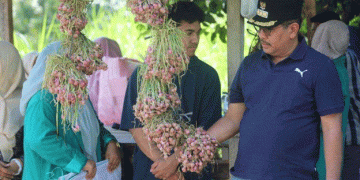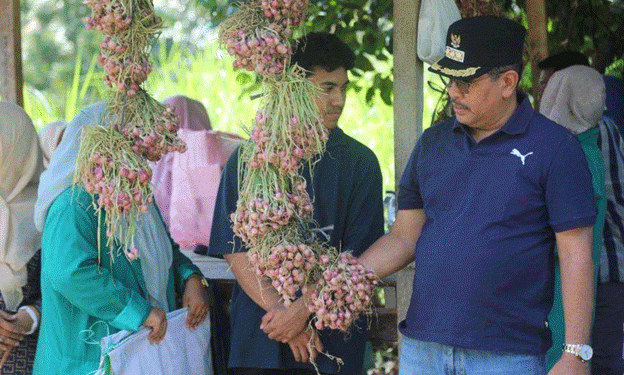On October 27, 2024, the city of Lhokseumawe and Syiah Kuala University celebrated the first successful harvest of red onions in Gampong Paloh Batee, Muara Satu district. The collaborative project with the Udeep Beusare Farmers Group, supported by the DIKTI Kedaireka Program, has aimed to enhance sustainable food resilience by empowering local farmers. The outcome of this partnership produced an impressive yield of 9 tons per hectare on a two-hectare plot, achieved within a rapid 65-day growing period.
The Acting Mayor of Lhokseumawe, A. Hanan, SP. MM, expressed pride in the project’s success and emphasized the importance of the sustainable cultivation practices adopted. “This initiative is not only about the harvest today but also about learning and implementing sustainable farming practices. Producing crops without harmful chemicals is essential for preserving soil quality and the surrounding environment,” Hanan remarked. He further noted that the project aligns with national policies aimed at stabilizing food prices and controlling inflation. By increasing local food production, the city can reduce reliance on imports and strengthen national food security.
Technology, Training, and Sustainable Methods
In their efforts to ensure sustainability, the farmers of Gampong Paloh Batee implemented eco-friendly methods, reducing their dependence on harmful chemicals. This approach has maintained high soil health while also yielding a strong harvest. The project’s success stems from the careful selection of resilient red onion varieties such as Bauji and Nganjuk. These varieties, coupled with specific cultivation techniques, helped mitigate the adverse effects of unpredictable weather, including irregular rainfall and extreme temperatures.
The city’s ongoing collaboration with Syiah Kuala University has provided the farmers with specialized training, focusing on sustainable and environmentally friendly techniques. Prof. Dr. Ir. Rina Sriwati, M.Si, head of the Doctor of Agricultural Sciences Program at the university, highlighted that adapting to climate challenges remains a priority for the project. She explained that selecting climate-resistant onion varieties and adopting appropriate cultivation practices were essential strategies in addressing these challenges.
Planning for a Stable Market and Reduced Price Fluctuations
This project also aims to stabilize the local onion market by encouraging farmers to follow improved planting schedules. Hanan hopes that by properly managing harvest timelines, red onions can be stored for up to six months, helping to balance market prices and prevent the common price volatility associated with onions. This initiative could lead to longer storage options, potentially mitigating the sharp price increases often seen in red onion markets during certain periods.
The long-term goal of the project is to establish Lhokseumawe as a key onion production center in Aceh, creating a reliable supply chain for this essential commodity. With continued training and guidance from the Syiah Kuala University Agriculture Faculty, local farmers can further refine their skills, leading to increased yields, economic benefits, and greater food security in the region.
The red onion harvest in Lhokseumawe marks a significant step toward achieving food independence through sustainable farming. The project exemplifies the power of collaboration between government, academia, and local farmers to implement eco-friendly agricultural practices. By reducing reliance on chemicals, focusing on climate-resilient techniques, and encouraging proper harvest planning, Lhokseumawe sets a model for other regions. As it establishes itself as an onion production hub, the city is not only enhancing food security but also paving the way for economic stability for its farmers and the region.































